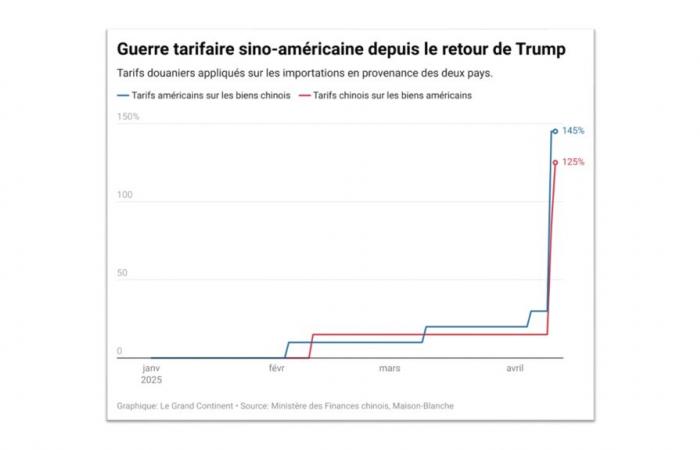Add
Article added
Download the PDF
On February 4, 2025, the first customs duties of 10 % on Chinese imports entered into force.
- In response, China has imposed 15 % prices on American exports of liquefied coal and natural gas (LNG), as well as 10 % duties on oil, agricultural machines, large displacement cars and pick-ups. These measures entered into force on February 10.
- Since then, commercial escalation has continued to intensify. On March 4, in addition to customs duties of 25 % on steel and aluminum imposed on all countries (which is equivalent to 45 % for China, already targeted by specific prices), Donald Trump increased rights on Chinese products to 20 %. China then replied with tariffs of 10 to 15 % on American agricultural products.
- On April 2, Trump announced new “reciprocal” customs duties of 34 % on Chinese imports and on April 3, the 25 % prices on cars entered into force. On April 4, China retaliated with 34 % rights on American goods.
- Between April 7 and 9, the Trump administration brought customs tariffs against China at 104 %. In return, Beijing increased them to 84 %, before Trump replied by raising them to 145 %. On April 11, China in turn imposed customs duties of 125 %.
Since then, faced with President Trump’s repeated statements claiming that discussions were underway between the two countries and that an agreement could be concluded in the coming weeks Chinese Foreign Minister Wang Yi reacted on April 25 in a message published on X: “China and the United States do not conduct any consultation or negotiations. The United States must stop sowing confusion. »»
- Beijing has however expressed a certain opening in recent days. The Chinese trade ministry spokesman said on Friday May 2: “The American party has recently transmitted messages to China by various channels, indicating her wish to initiate discussions. China is evaluating this proposal. »»
- The press release adds: “The tariff and commercial war was unilaterally triggered by the United States. If they wish to negotiate, they must show real sincerity, which notably assumes that they are ready to recognize their errors and to cancel the unilateral tariff increases. The position of China remains unchanged: if we have to fight, we will go to the end; If it is a question of discussing, the door remains open. »»
- On May 1, during an interview with Fox News, Marco Rubio stressed that the customs duties imposed by Donald Trump had a significant impact on the Chinese economy, adding: “The Chinese seek to establish contacts, they want to meet us, they want to discuss. »»
A sign of an opening, the two parties recently exempted certain customs duties products. Beijing has withdrawn from its list 131 products, representing a total of $ 40 billion in goods (around 32 % of the total American imports). For its part, Washington has granted exemptions on certain electronic products, including smartphones, for an amount of around $ 100 billion – or 22 % of all American imports from China .
- If the two parties obviously want to save the face before their public opinion – each presenting the opening of negotiations as an answer to the insistence of the other – they seem at the same time animated by a desire to limit internal economic damage.
- Technical discussions would indeed have taken place during the spring meetings of the World Bank and the IMF.
- According to the Wall Street JournalBeijing would currently study the means to respond to the concerns of the Trump administration concerning the role of China in the fentanyl trade – One of the subjects most likely to lead to rapid results – before starting more in -depth discussions aimed at rebalance the commercial relationship.
- But given the deep divergences on strategic subjects, relaxation could be short -lived.
- Once the Trump administration can take advantage of the agreements concluded with other countries – on April 25 Trump, said that “200” trade agreements had been concluded, without detailing if it spoke of countries or businesses, and that negotiations would be completed within 3 to 4 weeks – She could again refocus her attention to Beijing.






